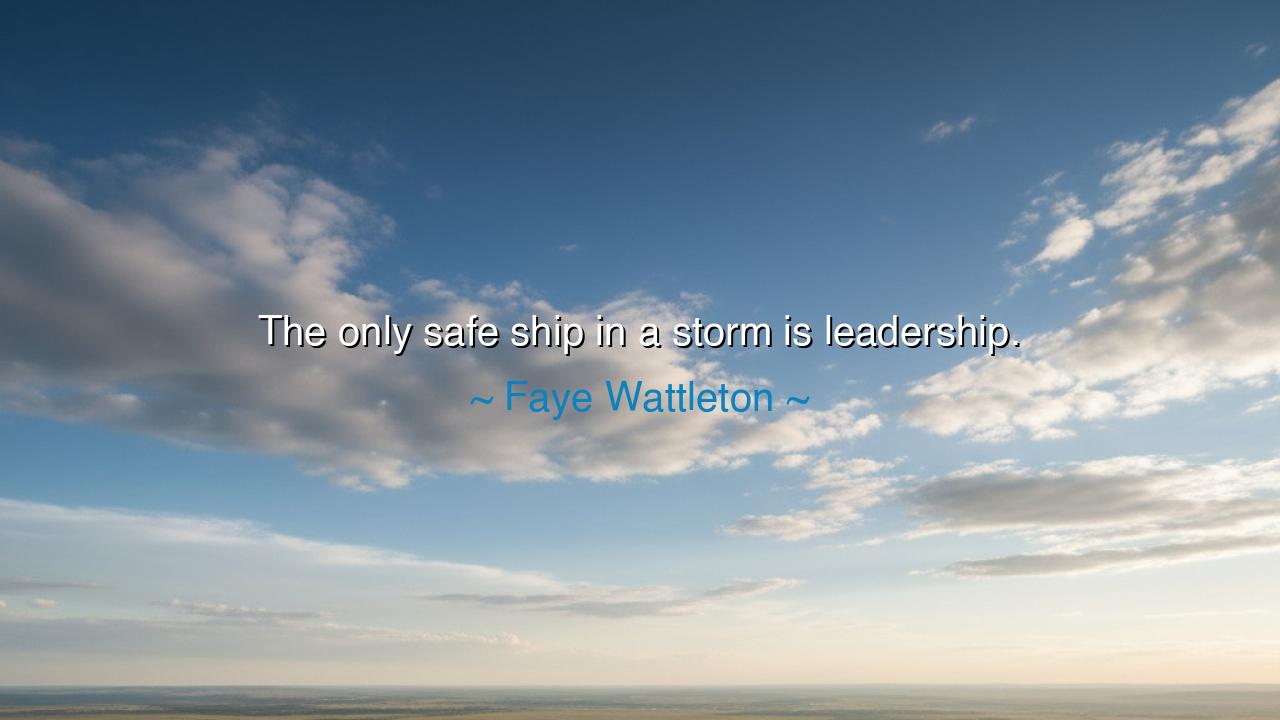
The only safe ship in a storm is leadership.






Hear the stirring words of Faye Wattleton, a voice of courage and vision, who declared: “The only safe ship in a storm is leadership.” In this saying shines a truth as old as the seas themselves—that when chaos rages and the waves of life rise high, it is not wealth, not strength, not numbers that preserve a people, but leadership. For a ship without a captain is but driftwood, no matter how mighty its hull. And a people without direction, no matter how gifted, will scatter like leaves before the wind.
The ancients often looked to the sea as the mirror of human life. Calm waters may be steered by any hand, but when storms awaken, the worth of the helmsman is revealed. Leadership is the rudder in the tempest, the compass when the stars are hidden, the steady voice that calms the trembling crew. Without it, even the strongest ship will be lost. With it, even the frailest vessel may reach the shore. Thus, Wattleton speaks not of ships alone, but of the human condition—of families, of nations, of every band of souls who journey together.
Consider the tale of Ernest Shackleton, the polar explorer whose ship, the Endurance, was crushed by Antarctic ice. In that storm of frozen death, no map could save his men, no equipment could deliver them. Only leadership—his calm resolve, his refusal to abandon hope, his tireless devotion to their survival—became the safe ship that carried them home. Though the Endurance sank, Shackleton’s men endured, for their true vessel was not made of wood or steel, but of trust, courage, and direction. This story lives as proof: in the storms of life, leadership is the ship that never sinks.
Yet let none mistake this for ease. To lead in storms demands more than command—it demands sacrifice. The leader must stand unshaken while others falter, must see further when the horizon is shrouded, must bear the fears of many and turn them into hope. It is in the tempest that the mask of authority falls away, and the soul of leadership is revealed. The storm does not create the leader; it only unveils what already lies within.
History is filled with both triumphs and failures of this truth. Nations have risen when their leaders stood like captains in the gale, steering with vision and courage. Nations have fallen when those entrusted with the helm abandoned it for fear or selfishness. The storm tests all—but it honors only those who grasp the wheel and guide others to safety. Thus, the true measure of a leader is not in times of calm, but in the chaos where all else fails.
The lesson, then, is clear: do not seek only to be strong in still waters. Prepare yourself to be a safe ship when storms come. Build within yourself the virtues of courage, steadiness, and clarity. Practice listening, so that you may guide wisely. Practice acting, so that you may move decisively. Practice compassion, so that your leadership binds hearts together, for a divided crew cannot weather any sea.
Therefore, in your own life, be the safe ship for those around you. In your family, at your work, among your friends, when difficulties rise, let your presence bring direction. Speak not words of panic, but of resolve. Show not the trembling of fear, but the steadiness of purpose. By such acts, you become the vessel that others may trust, the guiding strength that carries them through their storm. For in the end, Wattleton speaks truly: the only safe ship in a storm is leadership, and each of us is called to captain the small ships entrusted to our care.






AAdministratorAdministrator
Welcome, honored guests. Please leave a comment, we will respond soon